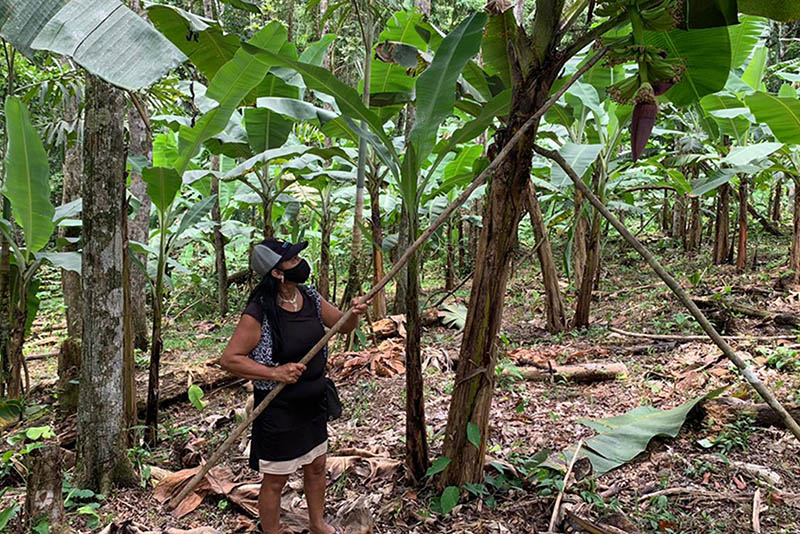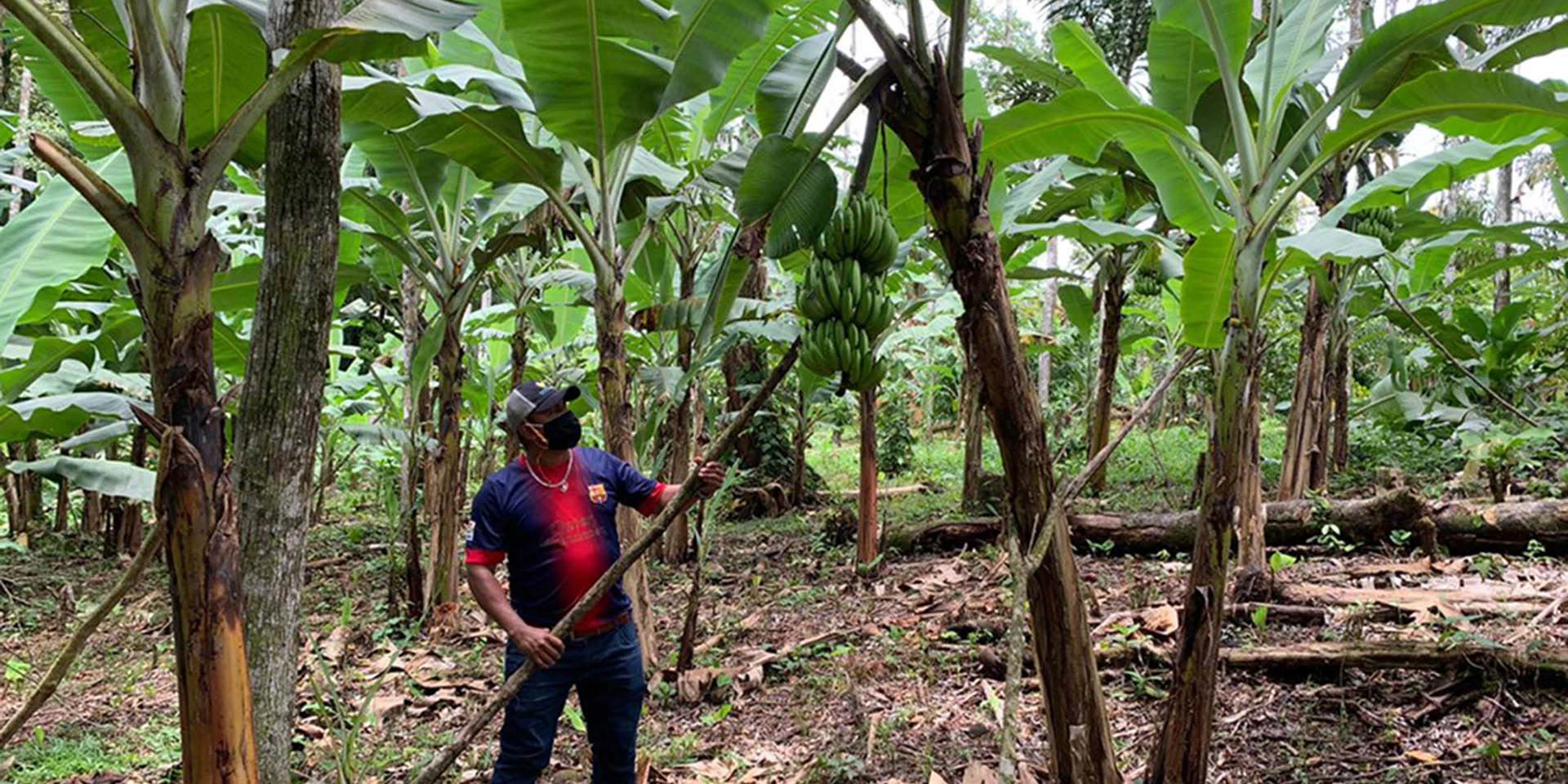By Monica De Leon
PANAMA CITY, Panama—In Talamanca, a region in Costa Rica close to the border with Panama, Demetrio Layan, part of the Bribri indigenous community, works on his two-hectare farm. Together, community members grow and harvest bananas that will later be turned into puree and exported to food companies around the world.
Until a few years ago, Layan and his community harvested bananas for their own consumption and to feed livestock. That changed when they began working with Costa Rica-based Paradise Ingredients, which sources 100 percent of its bananas from local communities. The company processes the bananas into 47,000 tons of baby food puree, juice, dairy products, and cocktail mixers that it ships annually to Australia, China, Europe, Japan, New Zealand, Russia, South America, and the United States.
The community farm is a crucial part of food processing company Paradise Ingredients’ supply chain. For Layan and his fellow community members, it’s something more, too – a way for families to work together while preserving the environment.
“We really love our land and what we do, and it fills us with pleasure to continue the work of our ancestors, protecting the environment, because this is our legacy for the next generations,” said Layan.

Banana producers from Talamanca, Costa Rica, are a crucial part of Paradise Ingredients’ supply chain.
This farm’s evolution from local producer to part of a global supply chain did not happen by accident. Paradise Ingredients was acquired in 2016 by the Central American Small and Medium Enterprise Investment Fund (CASEIF), an IFC client, whose focus is to support the growth and expansion of small businesses in the subregion. With the funding and operational support from CASEIF, Paradise Ingredients has grown from a small business to the largest banana processing company in the region.
While some global private equity firms have a reputation for being driven primarily by returns, a different model exists in this small corner of Central America. The model, most often found in private equity investments in emerging markets, combines equity financing, active governance, and operational and managerial support.
“The key to success for doing private equity in emerging markets is for the fund manager to be an active investor,” said Andrea Onate, Senior Private Equity Investment Officer at IFC. “The fund needs to provide more than just capital. It needs to create, promote and monitor value creation plans that will help businesses grow successfully and sustainably, and to ultimately become market leaders.”
An appetite for growth
With its new partnership with CASEIF, Paradise Ingredients made changes to senior management, significant investments to update its equipment, and standardized and optimized its production processes. The company also recognized the importance of working closely with small-scale banana farmers to supply the raw product they need to create puree. These improvements resulted in a 12.5 percent increase in production. Paradise Ingredients has also launched new lines of products to serve brands such as Coca Cola, PepsiCo, Gerber, and Nestlé.
“Paradise has changed the way we approach production, to make it better,” said Jorge Oruno, who leads the Association of Small Producers of Organic Bananas (UCANEHU), which represents over 200 local farmers and more than 1,500 families.
Private equity is an important force in financial markets, accounting for about $800 billion in investment worldwide each year. But only 12.7 percent of it reaches emerging markets.
IFC estimates that 75 percent of small businesses in Latin America and the Caribbean lack access to finance. That means an important source of capital isn’t being invested where it is needed most. This is even more relevant in the context of COVID-19, because small companies need liquidity to continue operating and protect jobs, while also looking for new and faster ways to adapt.
“Returning dynamism to companies”
CASEIF becomes involved in the governance of its investee companies both at the Board level and as part of executive and operations committees, said Hugo Chaves, CASEIF Investment Director and current CEO of Paradise Ingredients. Another key focus of the fund is to help businesses become certified in global quality management standards such as the ones developed by the International Organization for Standardization.
“Of course, we look at returns, but that is one of several aspects we contemplate when we evaluate our portfolio. It is a priority that we leave behind more solid, professional companies,” said Chaves. “The pandemic has given us a broader vision on the type of investments we should focus on in future placements. We aim to become a post-COVID reactivation fund, leveraging our track record on building solid companies and strengthening their resilience, so they can overcome similar situations. Our focus is to return dynamism to companies and help them restart the wheel.”
The company diversified its business following an additional $20 million investment in 2019, which helped it launch the natural fruit cocktail mixers. That created more than 100 direct and indirect jobs – a boon for the local economy.
Seeding development outcomes
CASEIF was attracted to Paradise Ingredients’ technical, human, and operational capacity potential to further develop the business. For the company, the private equity infusion from CASEIF has meant business opportunities for its banana and other fruit suppliers, stable jobs for the community, and career development opportunities for its employees. Employees go through continuous and rigorous training to ensure high-quality products are produced. Supporting gender equality has also been central to Paradise Ingredients since it was acquired by CASEIF. Today, 50 percent of the company’s workforce is female, and women serve in more than half of the managerial positions. There are now more robust operational policies and healthcare benefits for staff in place as well.
Paradise Ingredients has also been supporting the development of Costa Rican organic growers with crop management training that respects the community’s ancestral growing practices, which cultivates bananas without the use of chemicals. This has resulted in a more sustainable and climate-smart approach that has helped farmers increase production.
One farmer, Albertina Hernandez, from Talamanca, has increased her output from 200 kilos of bananas to 1,000 kilos a year. The improvements for this veteran farmer – she has been growing bananas for 20 years – transformed her business, she said.
“Before, we did not even know how to defoliate,” Hernandez said. “Now we really know how to manage the farm.”
Published in November 2020
